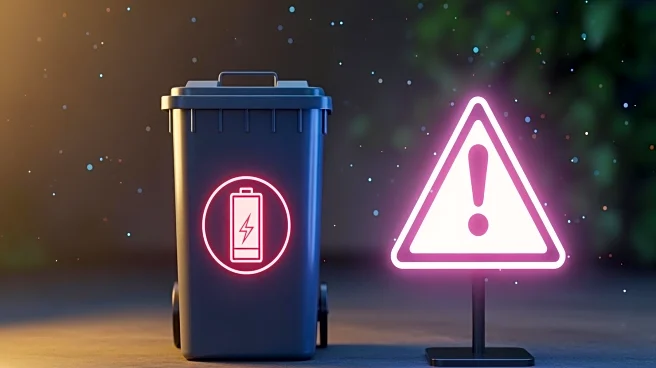What's Happening?
A recent incident in Lincolnshire, UK, has highlighted the dangers of improperly disposed lithium-ion batteries, particularly those from disposable vapes. On October 2, a battery exploded inside a refuse
truck, causing smoke and flames to pour from the vehicle. Firefighters from Grantham and Sleaford managed to extinguish the fire before it spread further. The incident underscores the risks posed by these batteries when mixed with flammable materials in waste trucks. Dan Moss, area manager for Lincolnshire Fire and Rescue, emphasized the serious risk these batteries pose to waste crews and firefighters. With the increasing prevalence of disposable vapes and battery-powered gadgets, similar incidents are becoming more common.
Why It's Important?
Lithium-ion batteries, such as those found in vapes, e-scooters, and smartphones, can ignite easily when damaged or exposed to heat. This poses a significant fire hazard in waste management settings, where they mix with flammable materials. Beyond the immediate fire risk, improperly disposed vapes contribute to e-waste and plastic pollution, releasing toxic metals and chemicals into the environment. The rapid growth of the vaping industry, particularly among teenagers, adds a public health dimension to the issue, with links to nicotine dependency and respiratory problems. The same products threatening sanitation workers also pose health risks to young users.
What's Next?
In response to the Lincolnshire incident, local councils are urging residents to bag used batteries separately and place them on top of bins for safe collection. Batteries can also be recycled at supermarkets or household waste centers, and many vape retailers now accept returns for proper disposal. Nationally, the UK government plans to ban disposable vapes by 2026, addressing both youth addiction and environmental damage. Until then, safe disposal practices are crucial to preventing waste-truck fires and reducing toxic e-waste in communities.
Beyond the Headlines
The incident highlights broader environmental and public health challenges associated with the rise of disposable vapes. As these products become more common, the need for effective waste management and recycling solutions becomes increasingly urgent. The potential ban on disposable vapes by the UK government reflects growing concerns over their impact on both human health and the environment, signaling a shift towards more sustainable practices.










